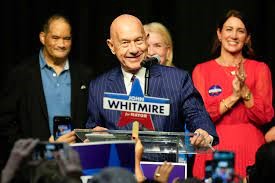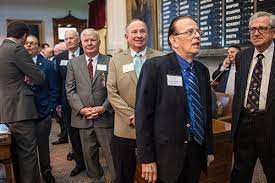
Here’s a quick recap of what happened over the last week:
Filing Deadline for 2024
The filing deadline to file for a place on the March 5, 2024 primary election ballot was 6PM on Monday of this week. I have included some of the highlights in the political notes below.
ERCOT Warns of Blackouts this Winter

A national trade group – the US Energy Association – hosted an event in Washington, DC this week to discuss in part the issues surrounding the reliability of electric grids in states throughout the US. Officials from ERCOT – the Electric Reliability Council of Texas – played part in the discussion and warned that the power grid is becoming increasingly prone to blackouts due to increased demand for electricity and closures of power plants. In addition, ERCOT President Pablo Vegas criticized the lack of funding and resources available for the development of more infrastructure – such as natural gas pipelines and transmission lines – that are needed to keep up with the state’s growth and subsequent demand for power. ERCOT has urged companies to reopen shuttered gas and coal facilities, but companies have been reluctant to make the investment.
The state has made changes to try and further secure the grid as the winter months approach. ERCOT has added 10 times more battery storage and about 10,000 megawatts of available power from solar energy. These changes are estimated to have the ability to power an additional 1 million homes, compared to the number of homes that were seeking power during the 2021 winter storm that caused widespread blackouts and caused the deaths of over 200 Texans. With all of the updates and changes, ERCOT officials say that blackouts are still a real possibility, but the number of homes affected will be fewer and the amount of time that power is not available will be decreased.
State Abortion Law Challenge

Abortion has been illegal in Texas since the US Supreme Court overturned the Roe v. Wade decision in June of 2022. The state had in place a “trigger” law, which immediately outlawed the procedure in anticipation of the Supreme Court decision. In the 2023 regular session earlier this year, lawmakers passed into law a bill that allows any citizen to sue anyone who helps perform or facilitate an abortion after 6 weeks of pregnancy. Therefore, leaving the state is the only option for a woman seeking to have an abortion. The only exception is if the woman’s life is at risk.
Recently, a Dallas woman sued the state in an attempt to have an abortion saying that her fetus has a lethal abnormality, and carrying the fetus to term would cause her harm and potentially impact her ability to have future children. A state district judge in Austin initially granted her request last week, but the Texas Supreme Court halted that ruling last Friday night. The Supreme Court order came in response to a request by AG Ken Paxton for the high court to intervene. Paxton also sent letters to three hospitals in Houston threatening legal action if they allowed the abortion to be performed at their facility. The court is also currently considering a case in which 20 Texas women claim they were denied medically necessary abortions due to the new Texas laws.
On Monday evening, the woman announced she was leaving the state to obtain the procedure. A spokesman from the Center for Reproductive Rights issued a statement saying that due to health concerns, and after her fourth visit to an emergency room, she had no choice except to leave the state. Also on Monday, the state Supreme Court overturned the lower court ruling that would have allowed her to have an abortion. The court said the law does not require a woman who meets the medically necessary exception to seek a court order. Rather it calls for doctors to use their best medical judgement to determine if the procedure is necessary. The ruling also directs the Texas Medical Board to provide more specific guidance to physicians to allow them to better assess each individual situation.
Houston Mayoral Race

State Senator John Whitmire was elected mayor of Houston last Saturday in a landslide victory over Congresswoman Sheila Jackson Lee. Whitmire garnered 64.4% of the vote compared to 35.6% for the Congresswoman. With Houston having experienced a growing crime problem over the last several years, Whitmire’s campaign promised to be “tough and smart” on crime by pledging to increase police response times and to supplement the city’s police force with state troopers to increase the overall law enforcement presence in the city.
In a runoff election where roughly two-thirds of all votes were cast during the early voting period, Whitmire had overwhelming margins of victory in precincts that have had an historically high turnout. Whitmire saw margins as high as 30 points in areas including Montrose and the Museum District, River Oaks, the Heights, Uptown, Memorial, Kingwood, and Clear Lake. Whitmire also had a tremendous financial advantage. Whitmire spent nearly $10 million in the campaign, including $3 million for the runoff alone. Jackson Lee spent roughly $2 million, and less than $1 million in the runoff. In the end, Whitmire received just under 130,000 of the 201,000 votes cast in the runoff election.
After the defeat, Jackson Lee announced on Monday that she would seek reelection to Congress. Jackson Lee will face former Houston city councilwoman Amanda Edwards in the Democratic primary. Edwards began campaigning for the Congressional seat shortly after Jackson Lee announced her run for mayor. Edwards has raised more than $1 million for the campaign so far. Jackson Lee has held the 18th Congressional District since 1994 when she defeated incumbent Craig Washington by nearly 30 points. She has easily won reelection ever since.
Senate Vacancy Created

Whitmire is currently serving a two-year term in the Senate, and the term does not end until December of 2024. Now that he has been elected mayor, he will have to resign his Senate seat before being sworn in as mayor in January. Therefore, Gov. Abbott will have to call a special election to fill the final year of the current term. It is anticipated that election will take place sometime in January. And, since the seat is up for reelection in 2024, any candidate wanting to run for the full four-year term beginning in January of 2025 had to file on Monday.
This means any candidate wishing to fill out the current term and serve the full term beginning in 2025 will have to face as many as five elections – special election and runoff; primary election and runoff; and finally, the general election in November of next year.
Whitmire was first elected to Senate District 15 in 1982. The district runs from the Memorial area in west Houston, and then north to take in areas of north Houston such as Humble and Atascocita, and then runs south to areas surrounding Jacinto City and Galena Park. Major candidates that have filed include Molly Cook, an ER nurse who gave Whitmire a surprisingly close challenge in 2022; state Rep. Jarvis Johnson who represents areas of north Houston in the House; and Karthik Soora, a researcher for the development of renewable energy and former chemistry teacher.
Political Notes
The filing period for the March 2024 primary election has concluded. Here are some of the highlights regarding challenges to incumbents and candidates for open seats. The winner of the March primaries will go on to represent their respective parties in the November election.
Gov. Abbott continues to release endorsements in contested Republican primary races, with the sole criteria being a member’s vote or position on education vouchers. We mentioned last week that Rep. Gary Van Deaver of New Boston in northeast Texas will face Chris Spencer of Hughes Springs. Van Deaver was a vocal opponent of education vouchers, which led to Gov. Abbott formally endorsing Spencer for the seat. Abbott has previously appointed Spencer to the Sulphur River Basin Authority. Abbott also endorsed Stormy Bradley in her Republican primary challenge to Rep. Drew Darby of San Angelo. Darby has also been a vocal opponent of education vouchers.
In the open seat House District 29 – Incumbent Rep. Ed Thompson not seeking reelection – Abbott has endorsed Alex Kamkar in the Republican primary. Kamkar is a real estate developer and member of the Pearland city council.
In another open Republican primary, Abbott endorsed Caroline Fairly of Amarillo in the race to succeed Rep. Four Price, who is not seeking reelection. Fairly and her family have a long history of involvement and financial support of Republican candidates in the Panhandle region.
Former state Rep. Alan Schoolcraft of Universal City will challenge incumbent Rep. John Kuempel of Seguin in the Republican primary. Schoolcraft served in the state House from 1981 to 1993. He currently owns a document services company and has not held elective office since he left the House 30 years ago. He claims to have $100,000 still left in his campaign account and will become the third challenger to Kuempel. David Freimarck, a tech specialist from Seguin and Greg Switzer, retired Marine Colonel also from Seguin are already up and running. Kuempel is another voucher opponent and currently serves as chair of the Higher Education committee. He was first elected in 2010 in a special election to fill the term of his father, who was serving as state Representative when he passed away. The district consists of Gonzalez and Guadalupe counties.
One interesting thing to note. All 16 of the 21 Republican House members that voted against the voucher issues that are seeking reelection received a challenger in the Republican primary.
Republican state Senator Paul Bettencourt, Republican from Houston, initially received a challenge in the Republican primary by Tomball ISD trustee Michael Pratt. The district is solidly Republican, taking in areas of west and northwest Harris County. Bettencourt was the Senate author of the property tax relief package approved by voters in November and serves as the chair of the Senate Local Government Committee. But as quickly as Pratt filed, he withdrew the next day. So Bettencourt is now running unopposed.
State Rep. Victoria Neave, a Democrat from Mesquite in the Dallas area has decided to mount a longshot Democratic primary challenge to incumbent state Senator Nathan Johnson of Dallas. Johnson was first elected to the seat in 2018 when he defeated one term incumbent Republican Don Huffines of Dallas. In the 2021 redistricting cycle, the Senate drew the seat to be more favorable to electing a Democrat. The Senate district runs from Irving through central Dallas and takes in areas of Mesquite and Garland. The voting age population of the district breaks down as 45% Hispanic, 30% Anglo, and 20% African American. Neave, first elected in 2016, will be giving up her chair of the House County Affairs Committee as well as her Chair of the Mexican American Legislative Caucus. Johnson has already secured endorsements from all Democratic members of the Senate.
That leaves Neave’s House District 107 open for the 2024 election. Investments counselor Linda Garcia of Mesquite was the first to file for the Democratic nomination in the safely Democratic seat.
Residency Challenge in Senate Race

An interesting development on a different Senate race. Senate District 30 is open due to incumbent Sen. Drew Springer not seeking reelection. The favorite – as least as far as endorsements – has been Brent Hagenbuch, the Denton County Republican Chair and owner of a transport company in Denton. He has received the endorsements of Gov. Abbott, Lt. Governor Dan Patrick, and AG Ken Paxton. On the filing deadline, Cody Clark, a retired Denton police officer declared his candidacy in the Republican primary. Also at that time, Clark filed a formal complaint challenging the residency of Brent Hagenbuch. Denton County appraisal records show Hagenbuch living in a part of Denton County that is in a neighboring Senate district. Hagenbuch disputed the allegations in an email to media outlets in Denton, but did not provide proof of residency.
State law requires a candidate for state level office to have lived in the district he or she is seeking to represent for at least one year before the general election. So, Hagenbuch will have to prove that his legal residency was established before November 7th of this year. That is state law regarding state House and Senate candidates. Candidates and office holders for Congress do not have to live in the district they run for or represent. They only have to be legal residents of the state of Texas.
Former Members Making a Comeback

Another interesting thing to come out of the filing period is the large number of former House members wanting their old jobs back. By my count, seven former members filed to run for the House again. First is the above mentioned Alan Schoolcraft mounting a Republican primary challenge to Rep. John Kuempel of Seguin. Here are the others:
Norma Chavez is running in the Democratic primary in an open seat in El Paso. Norma was defeated in 2010, and has since run for the House again and for Congress. In her last campaign – a 2018 run for Congress – she received 6.7% of the vote in the Democratic primary. She is running in House District 77, where incumbent Rep. Lina Ortega is not seeking reelection. She will face a current city councilwoman and a former county commissioner.
Solomon Ortiz, Jr. is running in the open House District 34 near Corpus Christi where incumbent Rep. Abel Herrero is not seeking reelection. Ortiz is the only Democrat and will face one of two Republicans running. This is a seat that leans Democrat, but the Republicans have targeted this seat to flip in 2024. Ortiz – the son of former longtime Congressman Solomon Ortiz – served two terms before being defeated in 2010.
Alex Dominguez is one of four Democrats looking to challenge incumbent Republican Rep. Janie Lopez of Brownsville in this swing district. In 2020, Dominguez unseated longtime Rep. Rene Oliveira and served just one term before running unsuccessfully for the state Senate in 2022.
Michelle Beckley is one of two Democrats looking to challenge first term Republican Rep. Ben Bumgarner of Denton. Beckley served three terms before running unsuccessfully for the Democratic nomination for Lt. Governor in 2022.
Kyle Biederman of Fredericksburg is challenging first term Rep. Ellen Troxclair in the Republican primary. Biederman unseated longtime incumbent Doug Miller of New Braunfels in 2016 and served three terms, choosing to not seek reelection in 2022. The district contains areas of west Travis County all the way out to Gillespie County.
Barbara Mallory Caraway is one of two Democrats to challenge first term Rep. Venton Jones in the Democratic primary in this central Dallas district. Caraway was a member of Dallas city council from 1993-2000, and then served two terms in the Texas House from 2006-2010. She then challenged Congresswoman Eddie Bernice Johnson in the Democratic primary in 5 straight election cycles – 2012, 2014, 2016, 2018, and 2020 – losing to the incumbent each time.
What’s Next??
We will wait to see if Gov. Abbott calls lawmakers back for a 5th special session before the end of the year. At this late date, that is looking less and less likely. The possibility remains of a special session sometime in January or February.
House members received notice this week that they should forward any ideas to the Speaker’s office for interim study topics by January 5th. All committees will receive their assignments for interim study issues shortly after that deadline.
